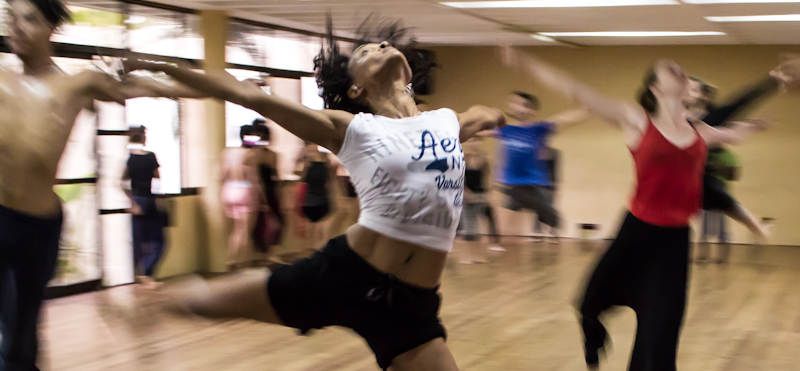
Why do arts and culture matter? What difference do they make to people’s lives? How do we know what difference they make to individuals and communities?
These and other key questions are at the heart of a unique new Centre for Cultural Value based at the University of Leeds.
The centre will focus on the role of arts and culture in areas such as conflict resolution, education, health and wellbeing, and community regeneration, bringing together researchers with expertise in these areas with artists, arts and cultural organisations, audiences, participants and local communities.
Funded by the Arts and Humanities Research Council, Paul Hamlyn Foundation and Arts Council England with an investment of £2 million over five years, this centre will collaborate and consult widely to advance understanding of the value of the UK’s arts and culture sector and its unexplored potential.
What role, for example, might the healing qualities of arts and culture play in our post-Brexit society?
“Our work will cover a diverse range of cultural activity from grassroots and community activities to work produced by our world-leading national organisations. ”
Dr Ben Walmsley, Associate Professor in Audience Engagement at Leeds, will lead the new centre.
He said: “Two questions at the core of the new centre’s work will be: ‘What does it feel like to engage with arts and culture?’ and ‘What tangible differences do arts and culture make to people’s lives?’.
“Our work will cover a diverse range of cultural activity from grassroots and community activities to work produced by our world-leading national organisations.
“The Centre for Cultural Value will help stimulate public debate about the role of national and local governments in creating and enabling cultural value, informed by robust and rigorous research.”
Cultural collaboration
The centre will bring academic researchers, policy makers and arts and cultural organisations together in useful dialogue and shared understanding. It will also involve a wide range of artists and arts and cultural organisations from across the UK in planning its programme and its activity.
Professor Andrew Thompson, Executive Chair at the Arts and Humanities Research Council, said: “Arts and culture can bring value to many areas of society: from the creative industries which drive economic growth, to grassroots arts projects that help to build community spirit. The Centre for Cultural Value will help to advance our understanding of this flourishing and diverse sector, bringing together a valuable evidence base for the importance of culture in today’s world.”
Jane Steele, Director, Evidence and Learning, Paul Hamlyn Foundation, said: “Collaboration is a key feature of the centre, which we hope will help to foster networks, communities of interest and greater mutual understanding between people working in different sectors, art forms and academic disciplines.
“I look forward to seeing the centre develop conversations with and between these groups and how these might help to develop new understanding of the value of the arts and culture for us all.”
“We experience the benefits of art and culture every day but all too often it can be difficult to evidence the impact of these opportunities in terms of our health, well-being and communities.”
And Arts Council England Deputy Chief Executive Simon Mellor added: “We experience the benefits of art and culture every day but all too often it can be difficult to evidence the impact of these opportunities in terms of our health, well-being and communities.
“The centre will be a fantastic research and resource hub for the sector and we look forward to working with them in the coming years.”
The remit of the new centre is broad and the range of its partners wide, but activities will include the following themes:
- Conflict resolution
How can fractured groups in society be brought together through “social healing”? The centre will consider why, although there is growing consensus that arts and culture develop empathy between people of opposing views, evidence in this area is sketchy and evaluation methods poorly understood and applied. - Education
World-leading companies such as Google say they need more creative thinkers, and yet the creative arts are being squeezed out of the National Curriculum. The centre will work with arts and cultural producers, teachers and policymakers to explore the increasingly vital role that arts education plays in young people’s personal and professional development. - Arts, culture and wellbeing
What are the tangible benefits of arts and culture on people’s wellbeing and physical and mental health? The centre will consider the role they can play in social prescribing – where GPs and other primary healthcare professionals refer patients to non-clinical services, such as singing, dance groups or art classes. - Cultural regeneration
How can “placemaking” investment in our towns and cities create better places in which to live that support the development of sustainable and diverse communities? What can we learn from the experiences of European Capitals of Culture, the Cultural Olympiad and UK Cities of Culture, as well as from smaller scale initiatives such as Creative People and Places? The Centre for Cultural Value will partner with researchers and practitioners from these cultural events to investigate the short, medium and long-term impact of these initiatives on local, regional and national communities.
Seeding future research
As well as building on existing research and best practice and sharing findings via events organised with partners across the UK, the Centre for Cultural Value will offer £200,000 of seed funding to arts and cultural organisations wishing to explore new methods of evaluating their cultural value with the support of a dedicated academic researcher.
Dr Walmsley said it was hoped the centre would also examine ways in which scientific methods could help assess the health impact and benefits of arts and culture, for example by measuring the body’s responses during performances.
International collaboration was also on the horizon, he said, with a potential initial network of centres stretching from Australia through Europe to North America.
As next steps, engagement events with interested parties will be held in the autumn.

The centre’s establishment was one of the recommendations of the AHRC’s Cultural Value Project, which examined issues around why arts and culture matter.
Professor Geoffrey Crossick, former Director of the AHRC Cultural Value Project, said: "The AHRC Cultural Value Project report stressed how individual experience of arts and culture generated so many of its benefits, the need for rigorous evaluation of those benefits rather than mere advocacy, and that cultural practitioners and organisations had to be engaged and know that research and evaluation would help their work.
“I'm delighted that the new Centre for Cultural Value will take forward the work begun in that project and move it in new and exciting directions."
Rooted in Leeds
The Centre for Culture Value will be based at Leeds’ School of Performance and Cultural Industries and supported closely by the University’s Cultural Institute, which plays a key role in strengthening the University’s position as a global centre of research and teaching excellence in culture, increasing pioneering research collaborations with creative sector partners, widening cultural engagement and participation in arts and culture, and widening students’ skills.
Professor Frank Finlay, Executive Dean for the Faculty of Arts, Humanities and Cultures and Director of the Cultural Institute, said: "I am absolutely delighted to congratulate Ben Walmsley and the whole team of colleagues on their tremendous success in bringing the national Centre for Cultural Value to Leeds.
"This very significant achievement will reinforce the University’s considerable investment and strong commitment to providing wider strategic support for the vibrant diversity of cultural activity in the UK. It is also a wonderful example of the rich potential of our vision for the arts and humanities in the 21st century, which will deliver real benefit to the creative and cultural sector."
“This very significant achievement will reinforce the University’s considerable investment and strong commitment to providing wider strategic support for the vibrant diversity of cultural activity in the UK.”
The announcement coincides with Leeds’ growing status as a flourishing hub for cultural and digital industries, as well as the media – embodied by the decision of Channel 4 to relocate its national headquarters to the West Yorkshire city, already famed for its strong financial and legal sectors.
- To register your interest in future Centre for Cultural Value activities and events, contact emaiul the Centre for Culture Value via CV@Leeds.ac.uk
Further information
- Main image by anna-m. w. via Pexels. Image of dancers by Photo by Michael Zittel from Pexels.
- For media enquiries email the University of Leeds Press Office at pressoffice@leeds.ac.uk.
- The Centre For Cultural Value’s core partners are: the Universities of York, Hull, Sheffield and Queen Margaret University (Edinburgh); The Audience Agency, Aesop, Arts Marketing Association, Association of British Orchestras, BBC, British Library, BFI, Contemporary Visual Arts Network, Coventry 2021, Creative & Cultural Skills, Culture Forum North, Eden Court Theatre, Leeds City Council, Museums Association, One Dance UK, National Theatre, National Theatre Scotland, Opera North and its DARE partnership with the University of Leeds.
Affiliate HEIs include: Queens University Belfast, University of Bristol, University of Highlands & Islands (Inverness), University of Liverpool, UCL, and University of Warwick. - The Arts and Humanities Research Council, which is part of UK Research and Innovation, funds world-class, independent researchers in a wide range of subjects: history, archaeology, digital content, philosophy, languages, design, heritage, area studies, the creative and performing arts, and much more. This financial year the AHRC will spend approximately £98 million to fund research and postgraduate training, in collaboration with a number of partners. The quality and range of research supported by this investment of public funds not only provides social and cultural benefits and contributes to the economic success of the UK but also to the culture and welfare of societies around the globe.
Find out more information via ahrc.ukri.org or follow on Twitter at @ahrcpress, on Facebook at @artsandhumanitiesresearchcouncil, or Instagram at @ahrcpress. - Paul Hamlyn Foundation was established by Paul Hamlyn in 1987. Upon his death in 2001, he left most of his estate to the Foundation, creating one of the largest independent grant-making foundations in the UK.
Our mission is to help people overcome disadvantage and lack of opportunity, so that they can realise their potential and enjoy fulfilling and creative lives. We have a particular interest in supporting young people and a strong belief in the importance of the arts. www.phf.org.uk/ - Arts Council England is the national development body for arts and culture across England, working to enrich people’s lives. We support a range of activities across the arts, museums and libraries – from theatre to visual art, reading to dance, music to literature, and crafts to collections. Great art and culture inspires us, brings us together and teaches us about ourselves and the world around us. In short, it makes life better. Between 2018 and 2022, we will invest £1.45 billion of public money from government and an estimated £860 million from the National Lottery to help create these experiences for as many people as possible across the country. www.artscouncil.org.uk